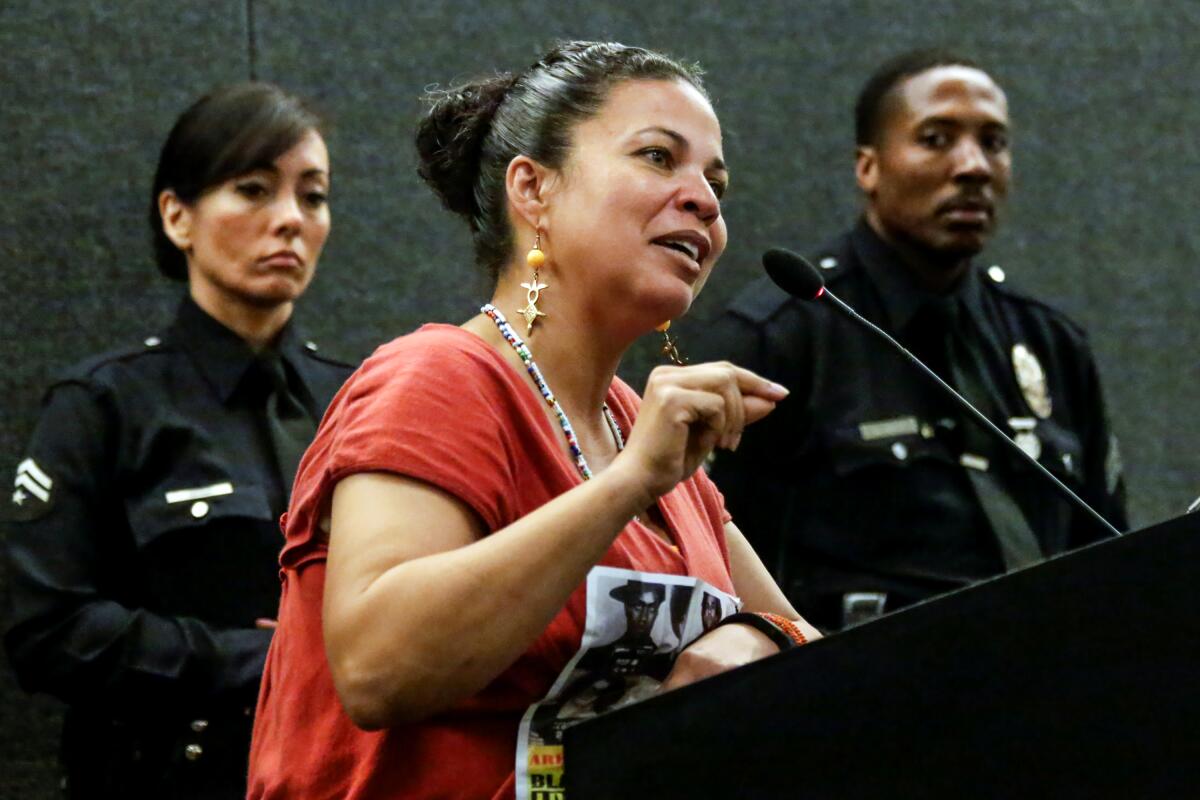BLM-LA says increased LAPD monitoring of protesters would mean further harassment

- Share via
Leaders of Black Lives Matter-Los Angeles called on the City Council to reject the recommendation of a review panel that the Los Angeles Police Department bolster its ability to collect information about protesters online.
Alleging that police already target its members for disproportionate scrutiny and harassment, the activist group also demanded more information about the LAPD’s current efforts to monitor its members. A City Council report published last week that noted police had deployed “shadow teams” of undercover officers during last summer’s mass protests raised concerns, the group said.
“They don’t see us as righteous protesters, they see us as criminals,” said Melina Abdullah, a Cal State professor who co-founded BLM-LA and helps lead it. “They are absolutely targeting Black Lives Matter and Black Lives Matter protesters.”
One of the group’s attorneys, Carol Sobel, said the LAPD risked returning to past dark episodes when it treated protesters who were critical of the police with a different set of standards than protesters who targeted other causes.
“When the police step up that kind of focus on people who oppose them, it raises concerns,” Sobel said.
Police Chief Michel Moore denied the accusation that LAPD targets BLM-LA, saying the department “is not engaged in any type of harassment campaign involving BLM or any other political/advocate organization.”
The use of the “shadow teams” of plainclothes officers who posed as protesters was described in a sweeping report released last week by a panel of former LAPD commanders the City Council convened to assess the LAPD’s response to the protests and unrest that erupted last summer over police killings of Black people.
Among the many shortcomings identified in the report, the panel recommended the LAPD purchase computer software to enhance its ability to “analyze open-source internet and social media content” in order to provide “useable intelligence” to commanders in the field.
The Council’s Public Safety Committee is scheduled to discuss the report on Wednesday. Committee Chair Monica Rodriguez’s office did not respond to questions about BLM-LA’s concerns Monday, but she has previously said she wants to pursue changes that help restore trust in police.
Capt. Stacy Spell, an LAPD spokesman, declined to comment on the report’s recommendations, noting there are two more reports to come — including one by the department itself — that Moore wants to review before deciding what changes, if any, are warranted.
But Spell said Black Lives Matter’s criticism of the “shadow teams” was misplaced. The teams are used, he said, to protect peaceful protesters from police harassment, not subject them to it.
Undercover officers are “inserted for the purposes of identifying if there are specific agitators or people who are committing crimes,” Spell said. “It’s actually very much in line with the idea of trying to make sure that people who aren’t engaged in criminal activity aren’t targeted.”
Gerald Chaleff, an attorney and former special assistant to LAPD chiefs who led the panel that authored the report, said the recommendations were only intended to help the department properly respond to protests. “It was not the recommendation that any group be specifically monitored,” he said.
Sobel said the department should tread carefully.
She pointed to the 1970s, when a group known as the Coalition Against Police Abuse drew attention to incidents of alleged police abuse and called for greater police oversight. The LAPD’s now defunct Public Disorder Intelligence Division infiltrated the group with undercover agents.
After the surveillance was discovered, the coalition sued the city with the help of the ACLU of Southern California, where Sobel was then an attorney. They alleged that the unit was unlawfully surveilling more than 130 law-abiding organizations. The lawsuit led the LAPD to disband the unit, and pay a $1.8-million settlement.
And last year, an LAPD informant was found to have infiltrated 2017 meetings of Refuse Fascism, an organization that frequently stages protests in the city.
BLM-LA officials said they plan to pursue multiple legal claims around the LAPD’s alleged harassment, in addition to a class-action lawsuit the group filed against the department over allegations of excessive force and other abuses during last summer’s protests.
One of the legal claims, which are precursors to lawsuits, centers on a swatting incident in August at Abdullah’s home. Armed officers descended on the house after receiving a 911 call from someone who claimed falsely to be holding Abdullah hostage.
The group claims LAPD officers did not follow the department’s protocols for responding to a call of a hostage situation and treated Abdullah and her children in an unnecessarily harsh manner when she emerged from the house.
“[L]aw enforcement intimidated and terrorized Ms. Abdullah and her family by pointing their weapons at her and threatening her as she exited her home with her hands up,” the claim states.
A second claim stems from an incident in December, when several protesters outside Mayor Eric Garcetti’s Hancock Park house were injured by officers in riot gear who stormed in to arrest a man with a bullhorn.
Officers, according to the claim, “knocked down peaceful protesters ... and then brutally beat them with batons, causing serious injuries,” in order to arrest the man with the bullhorn on a minor noise violation.
Greg Akili, a 72-year-old BLM-LA leader, suffered an injury to his hand after officers caused him to fall to the ground, and a woman named Shannon Thomas had several teeth come loose after being struck in the face with a baton, the claim alleges. A third protester named Emily Allers was also struck in the head and knocked unconscious, the claim alleges.
Taken together the encounters “indicate targeted harassment and mistreatment of BLM organizers by the LAPD,” said Cynthia Anderson-Barker, an attorney for the group.
More to Read
Sign up for Essential California
The most important California stories and recommendations in your inbox every morning.
You may occasionally receive promotional content from the Los Angeles Times.











